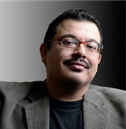
|
ECC - I'm knee-deep in research for my second book: a book-length sequence in the voice of Martín Ramírez, a Mexican outsider artist who spent most of his adult life institutionalized in California. I have notebooks full of lines and images. But I haven't figured out how Ramírez is going to "speak" on the page. Once I hear his voice, I will start drafting the sequence. MJL - What is it about the work of Robert Hayden that has captivated you? ECC - My first book is an homage to Robert Hayden. He's been my best teacher. He taught me this: craft and language are supreme. Subject matter is secondary. This freed me as a Latino poet. For years I worried about subject matter. Was it too Latino? Not Latino enough? Hayden's slender body of work is exquisite, full of poems about friendship, art, nature, and black history and culture. Hayden's work has given me the courage to both leap and to stand my ground. I want my work to explore and to question the world. I want my work to explore and to question the given particulars of my life. MJL - Though it may be different for each, can you share your journey from blank canvas to poem? ECC - Typically a poem begins with a bit of language I can't stop thinking about. I spend many hours obsessing; breaking down the language into syllables, rearranging the syllables into something akin to music. Once I start hearing music, I start drafting. MJL - Your work has been described as “weighty” due to the subject matter you address. Does the comment encourage you to stay true to the poetry you write or offer alternatives? ECC - I follow language. I don't lead it. I no longer worry about subject matter. ECC - To write poems that give me pleasure as a reader. MJL - Have you written in other genres (fiction, non-fiction, playwriting), and if so, which do you feel most related? ECC - I receive a lot of requests to write essays or reviews. I almost always say no. Why? Most of these requests come with deadlines. Deadlines stop me. They render me mute, deaf, and blind. I have dozens of abandoned essays, stories, and reviews begging to be finished. Maybe one day. Maybe. ECC - These days I'm reading a lot of fiction. I just finished Junot Díaz's new short story collection and Bernard Malamud's The Tenants. I'm also reading the novels of Ismail Kadare, an Albanian writer who is quickly becoming one of my favorites. MJL - Where action is vital to a screenplay and dialogue is vital to a play, what would you say is vital to a poem and how do you achieve it? ECC - Repetition and variation are vital to a poem. For me that means a braiding of consonants and vowels into music. Some notes are struck again and again. Here and there you strike a discordant note. MJL - Beyond writing poetry, what is your next great passion? ECC - Thinking about language. No joke. I walk around obsessing over language. I'm a nerd. A happy nerd. MJL - Though considered cliché, yet not for an institute of education, what advice would you give to aspiring poets? ECC - Obsess over the dead. Not living writers. Read everything you can. Let it all seep in. Pay attention to the language around you. Don't discard the lowbrow. Don't venerate the highbrow. Find a different path. Translate foreign poems into English. Remember: an interesting life isn't enough. Don't worship your teachers. Your peers aren't your competition. Your competition is silence, the Void. Writing is hard work. Don't forget that. MJL - Thank you so much, one last question... are you still drinking iced coffee and writing poetry at the
Starbucks in Casa Grande? Michael Laurenty is a produced playwriting student in the North East Ohio Master of Fine Arts Program (NEOMFA). He is currently working on his thesis, a series of plays entitled The Jung Trilogy and his first novel, Girl in the Wide-Brimmed Hat. Eduardo Corral’s Blog: http://lorcaloca.blogspot.com/
|
